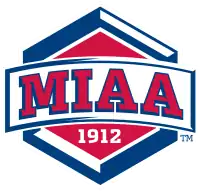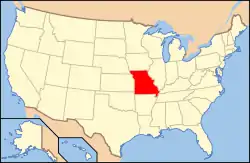Lincoln University (Missouri)
Lincoln University is a public historically black land-grant university in Jefferson City, Missouri. Founded in 1866 by African-American veterans of the American Civil War, it is a member-school of the Thurgood Marshall College Fund.
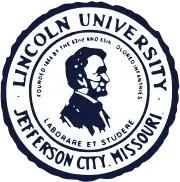 | |
Former name | Lincoln Institute (1866–1921) |
|---|---|
| Motto | Laborare et studere |
Motto in English | To labor and study |
| Type | Public historically black land-grant university |
| Established | January 14, 1866[1] |
Academic affiliations | Space-grant |
| President | Jerald Jones Woolfolk |
| Provost | Alphonso Sanders[2] |
| Students | 2,436 (Fall 2019)[3] |
| Location | , , United States 38.565070°N 92.169470°W |
| Campus | 167 acres (67.6 ha) (Main campus), 374.68 acres (151.628 ha) (University Farms) |
| Colors | Navy blue and White |
| Nickname | Blue Tigers |
Sporting affiliations | NCAA Division II – MIAA |
| Mascot | Stripes |
| Website | www |
 | |
History
Lincoln University Hilltop Campus Historic District | |
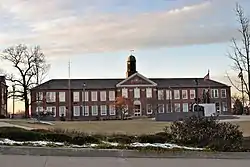 Young Hall | |
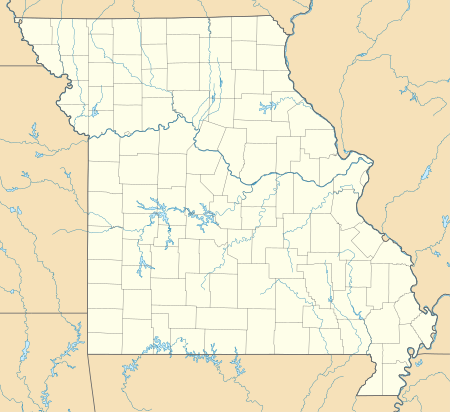  | |
| Location | 820 Chestnut St., Jefferson City, Missouri |
|---|---|
| Area | 9.6 acres (3.9 ha) |
| Built | 1923 |
| Architectural style | Colonial Revival |
| NRHP reference No. | 83000978[4] |
| Added to NRHP | April 28, 1983 |
During the Civil War, the 62nd Colored Infantry regiment of the U.S. Army, largely recruited in Missouri, set up educational programs for its soldiers. At the end of the war it raised $6,300 to set up a black school, headed by a white abolitionist officer, Richard Foster. Foster opened the Lincoln Institute in Jefferson City in 1866. Lincoln had a black student body, both black and white teachers, and outside support from religious groups. The state government provided $5,000 a year to train teachers for the state's new black school system.[5] Under the Morrill Act of 1890, Missouri designated the school a land-grant university, emphasizing agriculture, mechanics and teaching.
By 1921, the college had expanded to offer graduate programs and was officially designated a university by the state of Missouri. It changed its name to Lincoln University of Missouri. In 1954, it opened its doors to applicants of all ethnicities. It provides both undergraduate and graduate courses.
On May 22, 2019, Jefferson City was hit by an EF-3 Tornado, causing significant damage to the historic President's Residence near the campus.
Athletics
Lincoln University participates at the NCAA Division II level in Mid-America Intercollegiate Athletics Association (MIAA). Lincoln competed in the MIAA from 1970 to 1999, when it left because it had not had a football team since 1989. From 1999 to 2010 Lincoln competed in the Heartland Conference, of which it is a founding conference member. The school revitalized its football program and reentered the MIAA in 2010.[6] The Lincoln University Women's Track Team made NCAA Division II history by winning the Outdoor Track and Field Championships five consecutive times.[7]
The school has programs in the following sports:
|
Men's sports
|
Women's sports
|
Alma Mater "Lincoln, O, Lincoln"
The alma mater is sung to the tune of "Ach wie ist's möglich dann", a German folk song published in 1827 and variously credited to Georg Heinrich or Friedrich Silcher Kuchen (the West Point and Wake Forest alma mater songs use the same melody).[8]
Student activities
Founder's Day, traditionally held on the first Saturday of February, pays tribute to the founders of Lincoln University. Homecoming, usually held in October, is a celebratory time when family and friends of Lincoln University convene to participate in gala activities. Springfest, usually held in late April, celebrates the arrival of spring with games and other activities throughout the week.
Marching Musical Storm
The "Marching Musical Storm" is the university's marching band. It was founded in 1948 and is one of the largest student organizations on campus. The band performs at all home football games, select basketball games, and other school-sanctioned functions throughout the year.[9]
Student media
- The Clarion (university newspaper)
- KJLU (radio station)
- JCTV (Public-access television)
Fraternities and sororities
The National Pan-Hellenic Council organizations that have chapters at Lincoln University of Missouri are:
| Organization | Symbol | Chapter | Chapter Symbol |
|---|---|---|---|
| Alpha Kappa Alpha | ΑΚΑ | Alpha Iota | AI |
| Alpha Phi Alpha | ΑΦΑ | Alpha Psi | ΑΨ |
| Delta Sigma Theta | ΔΣΘ | Alpha Theta | ΑΘ |
| Iota Phi Theta | ΙΦΘ | Zeta Xi | ΖΞ |
| Omega Psi Phi | ΩΨΦ | Eta Sigma | ΗΣ |
| Phi Beta Sigma | ΦΒΣ | Beta Chi | BX |
| Sigma Gamma Rho | ΣΓΡ | Alpha Mu | AM |
| Zeta Phi Beta | ΖΦΒ | Xi Beta | ΞΒ |
| Kappa Alpha Psi | ΚΑΨ | Alpha Mu | AM |
Notable faculty and staff
| Name | Department | Notability | Reference |
|---|---|---|---|
| Alan T. Busby | Animal Husbandry | First African American alumnus of the University of Connecticut in 1918. | |
| Joseph Carter Corbin | First principal of University of Arkansas at Pine Bluff. | ||
| Myrtle Craig Mowbray | First African American woman to graduate from Michigan State University (then known as Michigan Agricultural College), in 1907 | ||
| Althea Gibson | black tennis pioneer, Wimbledon, French Open, and US Open champion who was an athletics instructor in the early 1950s | ||
| Lorenzo Greene | black historian who taught at the university (1933–1972) | ||
| Robert Nathaniel Dett | composer | ||
| Oliver Cromwell Cox | a member of the Chicago School of Sociology and early world-systems theorist who taught at Lincoln (1949–1970) | [10] | |
| Inman E. Page | President | President of school from 1880–1898 and again in 1922–1923 |
Notable alumni
| Name | Class year | Notability | Reference(s) |
|---|---|---|---|
| Oleta Crain | Advocate for black women's rights and desegregation. | [11] | |
| Rita Heard Days | Member of both houses of the Missouri State Legislature | ||
| Lloyd L. Gaines | Disappeared mysteriously after fighting for the right to equal education | ||
| Dorothy Butler Gilliam | First African-American female reporter at the Washington Post. Co-founder of the National Association of Black Journalists. | ||
| Exie Lee Hampton | active in YWCA, NAACP, Urban League, and settlement work in southern California | ||
| George Howard, Jr. | First African-American federal judge in Arkansas | ||
| Leo Lewis | Member of the Canadian Football Hall of Fame | ||
| Carey Means | Voice of Frylock on Aqua Teen Hunger Force | ||
| Zeke Moore | Former NFL defensive back | ||
| Oliver Lake | Jazz musician | ||
| Julius Hemphill | Jazz musician | ||
| Lemar Parrish | Former eight-time pro bowl National Football League (NFL) defensive back in the 1970s and early 1980s, and former head coach of the Blue Tiger football team from 2004 to 2009 | ||
| Wendell O. Pruitt | Captain Pruit was a fighter pilot with the famed 332nd Fighter Group (the Tuskegee Airmen) | ||
| Romona Robinson | Award-winning Cleveland television news anchor | [12] | |
| Joe Torry | Actor and comedian | ||
| Ronald Townson | American vocalist. He was an original member of The 5th Dimension, a popular vocal group of the late 1960s and early 1970s. | ||
| Maida Coleman | Senate Minority leader in Missouri | ||
| Blaine Luetkemeyer | U.S. Congressman | ||
| William Tecumseh Vernon | Bishop of the African Methodist Episcopal Church, and a former president of Western University | ||
| Joshua Peters | 2009 | One of the youngest members of the Missouri State House of Representatives, and a former SGA president | |
| Moddie Taylor | 1935 | African American chemist who worked on the Manhattan Project and became the head of Howard University's Chemistry Department from 1969 to 1976 |
References
- "Find LU Facts Quick – Lincoln University". Lincolnu.edu. Archived from the original on October 15, 2018. Retrieved September 10, 2016.
- Provost Archived December 17, 2018, at the Wayback Machine
- "Trends in Headcount Enrollment, 2013-2019". Missouri Department of Higher Education. Retrieved June 22, 2020.
- "National Register Information System". National Register of Historic Places. National Park Service. July 9, 2010.
- Lawrence O. Christensen (1999). Dictionary of Missouri Biography. U of Missouri Press. p. 312. ISBN 9780826260161.
- Lincoln returns to MIAA – St. Joseph News-Press – February 2, 2009
- "Lincoln University of Missouri Blue Tigers – Lincoln University Track & Field to be Inducted Into the Missouri Sports Hall of Fame". Lincoln University.
- "Lincoln University Songs". Archived from the original on March 4, 2016. Retrieved April 29, 2018.
- "Events – Marching Musical Storm – Lincoln University". Bluetigerportal.lincolnu.edu. Retrieved September 10, 2016.
- Sean P. Hier, "The forgotten architect: Cox, Wallerstein, and world-system theory," Race & Class Vol. 42(3): 69–86
- "Oleta L. Crain - Military Officer and Civil Servant" (PDF). Blair-Caldwell African American Research Library. 2004. Retrieved April 16, 2018.
- "Romona Robinson". WOIO. February 3, 2012. Retrieved January 13, 2016.
